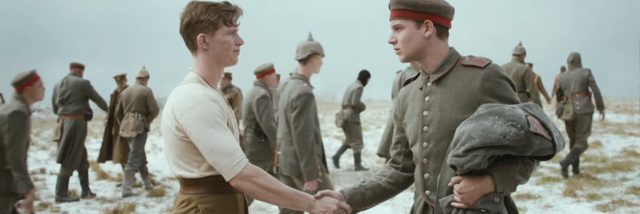The 1914 Christmas Truce
[dropcap]I[/dropcap]f you’ve seen the Sainsbury’s Christmas advert for this year, made in partnership with the Royal British Legion, then you might be aware of this uplifting, yet often overlooked, occurrence of the Great War, which is still inspiring many people and writers today. The RSC is staging a commemorative performance over the Christmas period this year called simply ‘The Christmas Truce’. So, I think it’s important to look at the inspiring events that happened, on that day, nearly one hundred years ago.
Four months into the First World War and many soldiers, on both sides, had become disillusioned with the glorious portrayal of war that had originally lead them to sign up. The feelings of patriotism, honour and the expectation that ‘we’ll all be home by Christmas’, that many men had gone into the war with, were quickly fading. The horrendous conditions they were living in, particularly in the harsh winter, partially outdoors in the trenches, would understandably mean that many began to feel disheartened.
Many had been blinded by the images and stereotypes of the Germans that had been heavily distributed in England, to ensure enlisting men hated the enemy.
Yet if, from the average British soldier, we take away the propaganda that they had been fed to get them to fight, then you are left with someone who doesn’t really know the enemy. It’s fair to say that that Christmas day in 1914 humanised the ‘enemy’ for many of those soldiers who took part in the unofficial truce. For a British soldier, coming face-to-face with a German solider, talking to them and realising that they were not that different from themselves, then what cause would he have to hate the other solider, save for that fact that he was a German? To quote a solider from the current BBC WW1 drama, The Passing Bells, who said when he heard of the Christmas truce: “it’s not much of a war if we don’t hate each other”.
In the weeks leading up to Christmas that December, when the festive spirit had begun to take hold in the hearts of soldiers who were far from home, there were exchanges of carols, general friendliness and even gifts, between the English and German lines. Consequently, those in high command reinforced the prohibition of ‘fraternisation’ but to little end, because, on Christmas Day, along many parts of the front line, both sides called an unofficial ceasefire – the spirit of Christmas had dissipated the hostilities between the two sides.
It amazes me to think, and realise, that these were soldiers, fighting each other in war, and for one day they decided, symbolically, to convene on ‘No Man’s Land’ and perfectly embody the Christmas-time values that one would think would have been rendered void in war.
They sang carols, exchanged gifts and celebrated Christmas together. The famous football match between the two sides, along one part of the line that day, was a story that travelled fast. It showed a rare light-hearted moment in the war and has been used in literature numerous times since; as the character of Blackadder said, in the popular BBC satirical comedy, on being asked if he remembered the match: “Remember it? How could I forget it? I was never offside! I could not believe that decision!” The Premier League and the FA will be holding a commemorative tournament this December, where they will send two British football teams to Ypres, which will also feature teams from other countries that fought: the 2014 Christmas Truce International Tournament.
It is important to remember, also, that there was never another Christmas truce. The soldiers increasingly saw the enemy as sub-human in the later years of the war, notably after the disastrous Battle of the Somme, in 1916. The 1914 truce really was unique, in the early months of the war, when the two sides were still able to find humanity in one another.
Those soldiers, being in one of the most tragic and devastating wars of modern times, showed that humanity could cut across enemy lines, and that the season of goodwill should be extended as far as possible, to all – personally, I think we would do well to remember that. This event has an enduring relevance, which is evident from the commemorative events taking place. But also, in light of recent conflicts in the Middle East, and unrest elsewhere, we need to be reminded, from this poignant example, the simple kindness and understanding that we should show to our fellow human beings, especially at this time of year.

Comments